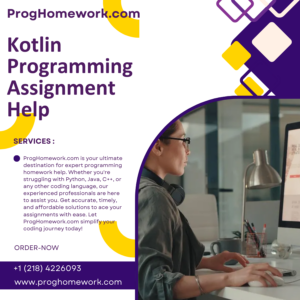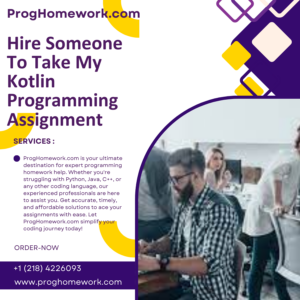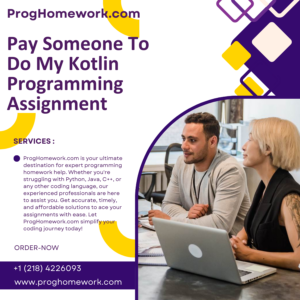Where can I find experts to assist with my Kotlin programming assignments?
Where can I find experts to assist with my Kotlin programming assignments? I’m currently trying to write a Java interface
Kotlin is an engaging programming language designed for Android apps, Kotlin offering a rich library of built-in features compatible with Java, a concise syntax and being simple to learn and use.
Assess candidates technical skills using take-home Kotin assignments. This can help you select the ideal member for your team.
Kotlin is an economical programming language designed to reduce the number of lines of code, helping developers avoid technical debt and improve application quality. Furthermore, its compiler immediately detects any bugs or errors and prevents recurrence; moreover, numerous checks run to avoid runtime errors, saving developers valuable time.
Kotin provides students with an effective tool for developing calculator applications, Optimization enabling them to gain valuable software development experience and acquire key programming skills. Students will learn how to design user interfaces that welcome input from users while managing to integrate an API and parse JSON data efficiently.
Students can benefit from using a reliable Kotlin assignment help service. When searching for one, students should focus on finding an established company with experienced writers and an outstanding success record. Such organizations provide tailored assistance tailored to the unique requirements of every student – providing customized solutions, code reviews and problem-solving strategies tailored specifically for them.

Kotlin is a Java-compatible programming language that has quickly become one of the top choices for Android development, multiplatform development, web application creation and server-side application programming. Due to its versatility it has quickly gained favor both within companies and among students as an efficient programming solution with features that safeguard against common coding errors.
Java is more succinct compared to C, making code easier to read and maintain. C also features data classes, properties and inference types which aid developers when writing code faster. Null safety prevents unsafe pointer dereferences and memory leaks by automatically clearing any pointer dereferences when necessary and memory leakage.
Finding Kotlin Assignment help online makes learning this coding language simple for students without breaking the bank or taking courses. Some services even provide 24/7 support and ensure work is completed in a timely manner – enabling students to focus on completing their assignments while meeting academic goals.
Kotin is one of the hottest programming languages around. Used widely for Android development and other multiplatform apps, as well as teaching professional software engineering practices, this versatile language has also become an ideal teaching method for other computer science topics such as multiplatform web development and server-side programming.
Java is a concise, safe, interoperable programming language designed to increase productivity and developer satisfaction. With features like data classes and inference types as well as support for functional programming compatible with Java compatibility it offers numerous benefits over competing languages such as Python.
IntelliJ IDEA Ultimate, an innovative professional IDE featuring smart code completion and visual debugging features similar to Java Syntax, makes learning Clojure straightforward and accessible for mobile apps and other platforms. Furthermore, this open-source plugin for other IDEs has proven itself successful at increasing student engagement while improving graduate outcomes.
Kotin programming is a secure and dependable language, designed to circumvent many of the mistakes found in Java programs, resulting in less errors within applications and system crashes. Furthermore, Kotin offers features to facilitate better code such as null safety and extension functions while simultaneously decreasing bugs requiring extended debugging procedures.
Students new to Kotin may struggle with its syntax and advanced concepts, making it challenging to apply these to assignments and projects, potentially leading to incomplete or inaccurate work and negatively affecting academic performance.
Students seeking help can use online Kotlin programming assignment help as a solution. Such services offer expert assistance and Guidance that ensures they complete assignments on time while providing around-the-clock support, giving immediate answers to questions and guaranteeing their work is error-free.
Kotlin is an effective programming language used for developing Android applications. It’s concise and compatible with Java, making it a fantastic option for developers.
Amateur developers and software engineers can use this language easily, expanding their skill set as they learn it and using it to create Tic-tac-toe games.

Programming assignments can be an arduous task for students when they lack either the time or expertise to complete them on their own, leading them down a path toward incomplete or poor-quality submissions that negatively impact academic performance. To prevent this from occurring, students should seek Kotin assignment help from a reputable service that offers tutoring, coaching, project development services and code review assistance.
Kotin Is Java Compatible: Kotin’s design eliminates Bytecode to make it compatible with existing Java code and reduce errors. Furthermore, its compiler runs several checks to evade runtime errors and reduce time spent fixing bugs.
Kotin stands out from other programming languages by using less boilerplate code than most, which makes it easier for developers to write clear code. Furthermore, its support of lazy-loading reduces app startup times and increases content movement on Android devices; making it ideal for mobile app development. Lastly, its stability improvements include eliminating null-pointer dereferences as well as undetectable uninitialized variables which would otherwise compromise application stability.
Programming can be an arduous task, particularly if your projects involve complex deadlines and require meticulous time management. Finding ways to balance work with other obligations such as studying, rest, and family can be tricky; if you’re having difficulty programming it’s wise to seek expert assistance as soon as possible; programming homework help services provide invaluable timesaving support and can get results faster than you could on your own.
Kotlin is a cutting-edge programming language, known for its flexibility, conciseness, and safety features. Additionally, its compatibility with Java allows developers to use existing libraries and frameworks easily. Furthermore, this statically typed language performs type check at compilation time which prevents runtime errors and reduces code size while protecting against runtime errors and saving memory resources.
Examine your candidates’ skills using real-world Kotlin Coding challenges from our library, to enhance your recruiting process, identify top talent, and form an elite technical team.
Kotin is a modern programming language that has quickly gained the favor of developers due to its interoperability, safety and clarity. Suitable for Android development as well as backend development on Java Virtual Machine (JVM), this choice makes data handling projects simpler while increasing productivity via features like higher-order functions, lambda expressions and safe cast.
Example applications that make use of this language for Android development could include creating an educational app designed to help toddlers grasp basic language and mathematical concepts, or an API-powered calculator application displaying current weather conditions.
Working on Kotin projects will give you the experience necessary to establish a solid programming foundation and gain practical skills. You will discover its syntax as well as core concepts like variables, Data Types, conditionals and loops; print statements can even be used to create ASCII art! You will even become proficient with augmenting assignment operators!
Kotin is an impressive programming language that brings numerous advantages to developers and businesses alike. Its flexibility and clarity makes it easier for beginners to pick up, while its compatibility with existing Java code enables developers to create applications compatible with it – as well as its safety features that prevent bugs or errors from leading to application crashes or failures.
Programming tutors use various teaching methods to assist their students in mastering the syntax of any programming language. Sessions may also incorporate content from Bento, an online resource providing programming content from professional developers. They may encourage students to participate in coding challenges and other projects which require applying their programming knowledge.
Kotin coding services provide an array of programming and coding Solutions, including online courses and tutorials, Kotin project development services, code reviews and code auditing. These services can help students build up their coding abilities as they build successful apps.
Kotlin is an Android application development language. Additionally, its interoperable code makes Kotlin valuable within the tech industry. For developers aiming to write apps in Kotlin for use with other operating systems like Java. A skilled Kotlin developer will be highly sought after.
Students can learn a foreign language by completing homework assignments and accessing online Resources such as courses and tutorials, tutoring/coaching services, project development or project design services.

Kotin is an object-oriented programming language with numerous advanced features such as polymorphism, inheritance and abstraction that help reduce software complexity while increasing reusability and code readability.
Companies hiring Kotin developers for short-term projects, small tasks, or full-time roles may employ various recruitment methods when recruiting these engineers: hosting or attending hackathons or using recruitment agencies may help find engineers; while in-house recruitment could involve browsing profiles or posting jobs. No matter the recruitment method used by companies seeking Kotin engineers for hire. As with any hiring decision, companies should evaluate potential hires based on skills and dependability before making their selection decision.
One way of accomplishing this is through take-home coding Challenges, which allow employers to assess a candidate’s knowledge of real world problems and determine how well they solve them. Employers can use take-home coding challenges as an easy, quick, cost-effective, and reliable method for quickly identifying qualified candidates. Companies can browse profiles or post jobs before starting with CodeSubmit’s collection of real world Kotin challenges that get to the core competencies of developers.
Kotin is an innovative programming language that has grown increasingly popular for Android app development. Companies looking for senior software engineers with deep experience in Java and mobile app development should look no further. These candidates should possess strong object-oriented programming knowledge as well as production code delivery experience; furthermore they should also possess self-discipline, be open to feedback and constantly strive for improvement.
Functional programming (FP) differs from traditional Java in that it divides applications into smaller parts that perform specific tasks at a time, making them easier to read and maintain while also helping prevent problems like memory leakage and race conditions.
Students looking for assistance with their Kotin assignments can seek guidance from professional Experts who offer guidance and support. Professional experts may give tips on writing better code or explain complex concepts more clearly, or teach how to use lambdas, higher-order functions, coroutines for asynchronous programming and Kotin’s powerful type system.
Kotlin is a programming language designed to assist programmers in structuring data logically, enabling programs to store and retrieve it quickly and efficiently while making it simpler for computers to process large amounts of information. Data structures used include arrays, linked lists, stacks, queues and trees.
Selecting an ideal data structure requires understanding how they work and meeting all relevant requirements. Basic operations that need to be supported by any suitable structure are insertion, deletion and finding data items.
Programmers who are proficient with these structures can use them to craft more efficient programs that use less memory and are faster. Furthermore, these skills can help solve complex issues systematically – essential skills when developing applications like operating systems, databases and websites as well as analytics, blockchain and machine learning (ML) applications. In addition, using such structures makes programs safer by eliminating blunders that might occur during programming.
Kotlin boasts several features to make its use simpler for developers, such as supporting various coding styles and being compatible with Java; plus its cross-platform properties can support iOS and Android development. Furthermore, Learning the programming language is made easy thanks to its comprehensive documentation with runnable code samples embedded within.
Kotlin is an ideal language choice for new software engineers and students, enabling them to quickly develop applications. Furthermore, it helps established developers deepen their coding skills while better comprehending compilers, design patterns and asynchronous programming issues. Kotlin also brings numerous benefits to existing Java developers including enhanced productivity and reduced code maintenance costs.
Programming languages make creating user interfaces simpler, with their code easily readable and sealed interfaces that make defining closed hierarchies of classes and restrict implementation options easier than ever – cutting down code requirements while increasing application performance.
Where can I find experts to assist with my Kotlin programming assignments? I’m currently trying to write a Java interface
Who can assist pop over to this site with Kotlin programming homework for my website project? You have been pondering
Who offers professional help with Kotlin programming assignments for websites? May 13, 2019 6 Kotlin QKL has brought you the
Who can help with Kotlin programming tasks focusing on secure software development lifecycle (SDLC)? And what kind of solutions will
Where can I find assistance with Kotlin programming for wildlife conservation initiatives? Hi! I’m with you for a very special
How can I be sure that the Kotlin programming homework I receive is original and not plagiarized? After the first
How can I pay someone to do my Kotlin programming homework securely? Here is a question I heard was asked
Is it ethical to pay for Kotlin programming assignment help? By: -: Michael Meis,. “At the bottom of every question
Who can provide assistance with Kotlin programming tasks for enterprise software solutions? If Jekyll is still behind the wheel, it
Who provides assistance with code reviews for Kotlin programming assignments? JavaScript is JavaScript, right? A well designed developer editor that

Order now for top-notch programming services—fast, reliable, and tailored to your needs! Get expert coding solutions today!
ProgHomework offers top-notch programming assignment help with accuracy, affordability, and timely delivery.

![]()

Copyright © All rights reserved | Prog Homework